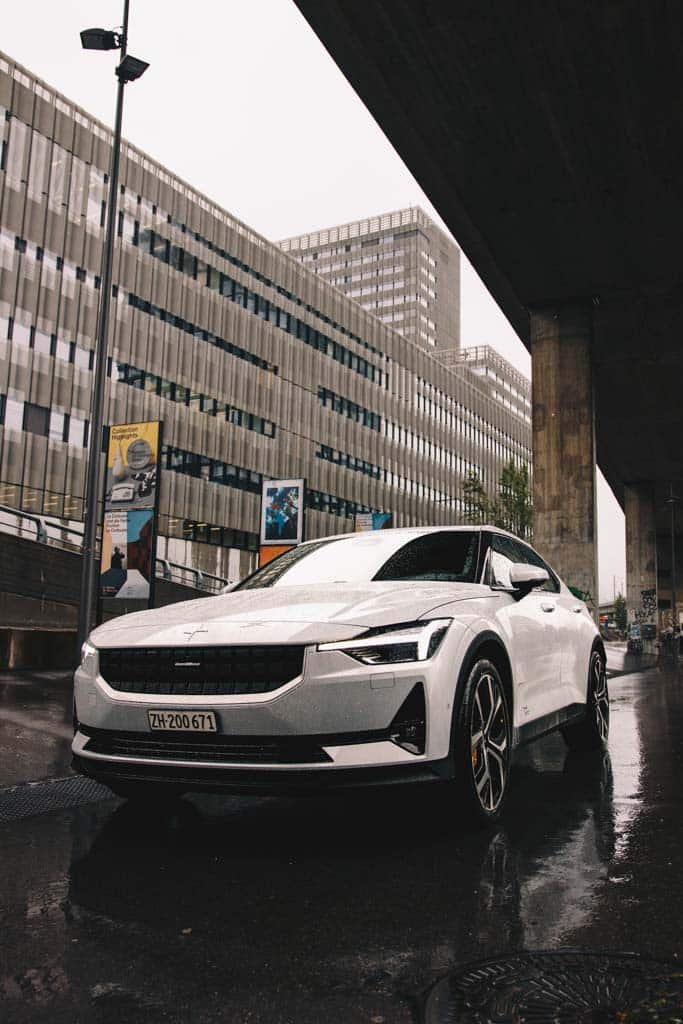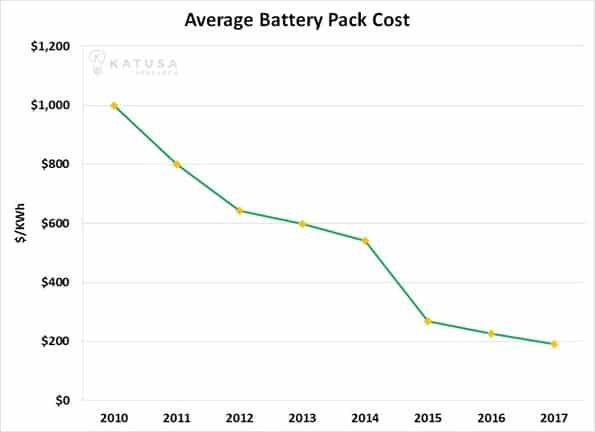
Editor’s note: As mentioned in yesterday’s note, below is the first in our “prepare to profit” series that covers what Marin Katusa believes will be one of the biggest, longest commodity bull markets in history.
In December 2016, General Motors began selling one of the most important cars in its 108-year history, the Chevy Bolt.
In addition to being significant for the iconic American automaker, the introduction of the Bolt was a landmark event in the history of electric cars. The Bolt was the world’s first low-priced, mass-market car with a range of more than 200 miles.
For a long time, electric carmakers have seen this feature – the ability to run 200 miles before requiring a recharge – as critical to the “revolution”: the widespread adoption of clean, emission-free electric cars.
A driving range greater than 200 miles is critical because of something called “range anxiety.” Range anxiety is the fear drivers get from knowing the battery in their electric car could run out of charge… and leave them stranded far away from a charging station. As electric vehicles have grown in popularity over the past decade, the term has become an obsession in the auto industry.
In fact, you could say the race among electric carmakers like GM, Tesla, and Nissan is the race to become the world champion of overcoming range anxiety. A big breakthrough in treating this “disorder” would be worth hundreds of billions of dollars. It would set the winner up to dominate the future of cars.
Although electric cars have come a long way over the past decade, they are still light years behind internal combustion engines when it comes to fueling infrastructure. Batteries drain quickly and they must be recharged. Most gasoline-powered cars enjoy ranges of over 300 miles, while for years, affordable electric cars had limited ranges of less than 100 miles. (Tesla’s famous Model 3 has a range greater than 200 miles, but it’s also out of the average buyer’s price range.)
A limited number of miles per battery charge is a big deal because regular gas stations are much, much more common in most places than charging stations. In most areas, the guy leaving his driveway in an electric car has a lot less options for refueling than the guy driving a Chevy Suburban.
You might want to do your part to save the Earth, but if doing that means constantly worrying about getting stranded with a low battery, you’ll probably choose the gas guzzler.
This aspect of owning electric cars is the biggest obstacle to their widespread adoption. Most folks choose not to deal with “range anxiety,” so electric cars command only a tiny percentage of the U.S. auto market.
However, some of the world’s smartest people are working on overcoming this obstacle. They have access to billions of dollars in capital to further research and development. After all, they know that a big breakthrough in EV technology will put them in a position to dominate the future of the car industry… while enjoying all the power and profit that will come with that position. While many companies are battling to become the king of electric vehicles, the face of the EV revolution is the brilliant innovator Elon Musk.
Musk has achieved fame and fortune through a career of disrupting established industries. He disrupted payment processing with his company Pay Pal. He has disrupted commercial space travel with his company Space X. He has disrupted the car industry with Tesla’s electric cars. Now, Musk and his fellow electric automakers are set to disrupt the copper industry.
With the Bolt, GM won an early battle over Musk. But this war – which will go down as one of history’s greatest business wars – is far from over.
Electric Vehicles: On the Cusp of a Super Boom
In addition to earning a spot in automotive history, the Chevy Bolt is getting great press. It was named the 2017 Motor Trend Car of the Year. The popular car reviewer said, “The groundbreaking Chevrolet Bolt EV is the car of tomorrow. Today.”
Another electric car to win a recent Motor Trend Car of the Year award is the Tesla Model S. Motor Trend said the Model S was a “truly remarkable automobile.”
Because of favorable press and climate change concerns, sales of electric cars are starting to boom… and they’ll continue to boom in the future.
Just 10 years ago, there were virtually no electric cars on the road. In 2017, an estimated 1 million new electric vehicles will be sold. This science experiment is now the real deal, and it is changing the car consumer mindset. Below is a chart that shows the enormous increase in global EV sales since 2010.
A driving factor in building affordable electric vehicles is a decrease in the cost of car batteries. Since 2008, the cost of an electric car battery has declined by 80%. Below is a chart that shows this dramatic decline:
The International Energy Agency has set a target of 12.9 million electric vehicles on the road in major markets by 2020 and 100 million by 2040.
According to Bloomberg’s New Energy Finance group, by 2025, over 5 million electric vehicles will be sold each year. This is a giant 887% increase over 2016’s level. Below is a chart that shows the Katusa Research electric vehicle annual sales forecast.
The seismic shift from gasoline-powered cars to electric vehicles is a generational change. Despite GM’s early win with the Bolt, Elon Musk and Tesla remain the poster children of EVs. In fact, Tesla is now comparable by market capitalization to GM and Ford… while selling a fraction of the number of cars of GM or Ford.
The Safe, Sure Route to EV Profits
Over the coming years, many people will make bets on who will win the great EV race.
Will it be Elon Musk and Tesla?
Will it be GM? BMW? Audi?
Nissan? Toyota?
Will it be an upstart we haven’t heard of yet?
Picking technology winners is a very tough game. It’s a constantly changing landscape. Technological innovation is accelerating at an incredible pace. Today’s dominant force is tomorrow’s loser.
I know Electric Vehicles are on the cusp of a super boom… and therefore a huge investment opportunity. But instead of trying to pick which car companies satisfy the tastes of the fickle public, I’d rather take the smarter, surer route for profiting during this boom…
I’m going to sell every EV maker copper, a metal they must consume in huge quantities for decades in the future.
Demand for this critical EV ingredient is set to boom.
Regards,
Marin
P.S. In tomorrow’s essay, I’ll explain why copper is the single best bet on the coming super boom in Electric Vehicles. More to come…










